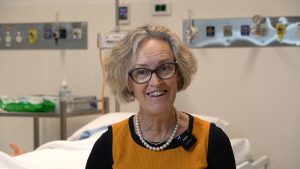South Australian researchers are trialling a nutritional intervention for obese men to improve fertility without requiring weight loss.
Aiming to tackle the health risks that can be passed on to children by fathers who are obese at the time of conception, the Diet for Dads Sperm (D4Ds) study focusses on diet quality, rather than weight loss alone.
Improving health without weight loss
The aim of the research is to test whether the current clinical advice to lose weight should be modified to highlight the importance of nutritional sufficiency as opposed to losing weight by any means.
“The reason for that is to avoid unintended consequences,” said researcher Professor Gary Wittert, Senior Consultant Endocrinologist at the Royal Adelaide Hospital and Director of the Freemasons Centre for Male Health and Wellbeing based at the South Australian Health and Medical Research Institute.
“For example if losing weight with a suboptimal diet increases the risk of transgenerational chronic disease risk, then that’s a serious problem.”
Ground-breaking animal studies conducted in Adelaide by Dr Nicole McPherson have shown that obesity at conception increases obesity rates and chronic disease risk in offspring.
This intergenerational transfer of risk is possible by passing on epigenetic changes which are caused by behavioural and environmental factors such as diet and exercise. Epigenetic factors affect gene expression, effectively turning certain genes “on” and “off.”
This work also indicated that weight loss through severe energy restriction may have unintended consequences for sperm quality and could negatively impact the health of the subsequent child.
Now, the research team including Dr Nicole McPherson and Professor Gary Wittert is seeking to determine whether current clinical guidelines, that recommend weight loss for men who are obese prior to conception, are appropriate.
“We have shown that poor nutrition associated with obesity rather than increased fat mass may be one of the driving factors in obesity related subfertility, and as such weight loss may not even be required if nutrition is optimal,” said Professor Wittert.
The research team believe that feeding men who are obese and have a suboptimal diet a nutrient dense diet will improve sperm quality even if weight is not lost.
Professor Wittert sees improving the health of would-be parents as a critical opportunity to break the cycle of chronic disease from generation to generation.
“When you’ve got young people contemplating pregnancy and they’re being counselled by GPs and other healthcare providers, that’s a critical window where I think they’re much more likely to follow advice, such as around alcohol consumption and smoking. Now we can hopefully add healthy eating to that, in terms of minimising transgenerational disease risk.”
The Diet for Dads Sperm (D4Ds) study
The Diet for Dads Sperm (D4Ds) study will compare the effect of a suboptimal low nutrient diet to a nutrient dense diet over 12 weeks.
This study is led by Dr Nicole McPherson and colleagues from the Freemasons Centre for Male Health and Wellbeing at the University of Adelaide, the Robinson Research Institute, CSIRO and SAHMRI.



